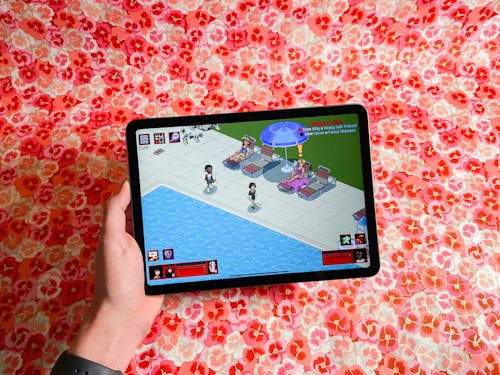
Netflix's push into games was one of the ways the streaming service hoped to sweeten the deal for subscribers and keep them around longer.
With the company expecting to lose two million subscribers by July, what exactly are games doing to help?
Regardless of how any of us feel about Is It Cake?, Netflix's historic loss of 200,000 subscribers and the dramatic stock drop that followed don’t speak to the company's ability to make interesting shows or movies, as much as it does reality finally catching up to Wall Street's darling streaming service. The company finally has real competition in HBO Max and Disney Plus, it's only natural it would be harder to justify a $20-per-month subscription.
Netflix has plans to address its current financial woes, including a test of a lower cost ad-supported subscription tier, and a new way to make a few bucks off of password sharing. But what of the company's creative decisions?
Netflix Games launched in November 2021, was supposed to do the obvious: apply Netflix’s successful content-model to video games. Netflix drew audiences by licensing a back catalog of popular TV shows and movies, only later filling things in with its own original content. Netflix has so far taken a similar approach to games, collecting mobile titles (and acquiring development studios like Night School and Boss Fight Entertainment) to create a small library of games for iOS and Android.
The results are mixed. In some ways reflecting the sort of passive, watch-it-in-the-background content I've come to associate with modern Netflix programming and in other cases highlighting the kind of odd and unique games that might only exist today.
To better understand where Netflix Games is at today (and it’s decidedly "early days" with these) I've played everything Netflix has available. Below are short reviews of each game, organized around the types of games Netflix seems interested in featuring so far.
The early days of mobile games lives on
Card Blast
This card game relies on your basic knowledge of poker hands. You're presented with three lanes to make hands, and a conveyor belt of randomly drawn cards that are inching their way towards a saw blade that'll destroy them. Each level presents different challenges –– maybe you need to make pairs or royal flushes –– and scores you're trying to hit. The presentation leaves something to be desired, but it's surprisingly fun just making high value hands as fast as you can.
Shooting Hoops
I hate Shooting Hoops, but only because I'm terrible at it. Basically, the game has you trying to get a basketball into a hoop by tapping to fire off a (non-lethal) gun attached to a ball. Taps can send the ball spinning wildly depending on which way the gun is facing, and you have limited ammo.
The game is simple, requiring a single tap to play, and it reminds me a lot of a Flash game I would have played on my family’s Gateway back in the day. It's also ridiculously challenging, at least for me.
Dominoes Café
Not much to say about this one other than it’s dominoes. If you know how to play dominoes you'll get a kick out of the game, but it's fairly straightforward in a way that doesn't leave much to the imagination.
Bowling Ballers
Much in the same vein of the infinite runners that characterized the early days of App Store games, Bowling Ballers is mainly about steering. You steer your bowl (or dog, or other customizable orb) into pins, pick up coins, and hit jumps as you roll down a lane. There are daily challenges, but it seems pretty satisfying to make your way through the levels that come with the game. There’s evidence of microtransactions that could have been in a previous version of the game, and have somehow been stripped out. It seems like another great waiting room game.
Knittens
Bizarre and cute, Knittens is a match-three game about collecting yarn... to knit clothes for your cat. Things get more complicated as you play, but when it comes down to it you're just clearing yarn off the board so you can later use it to customize a series of increasingly involved patterns. The flat, 2D art of the game is a little disappointing, but the cats are cute and the weirdness is greatly appreciated.
Teeter (Up)
A Frosty Pop joint (the company is all over Netflix’s early catalog), presenting a simplified version of the game TumbleSeed. You try and get a ball to a hole somewhere on the screen, tapping on one side or the other to raise either end of a board. The goal is getting the ball to its desired location without building up too much momentum and completely flinging it off the screen. Far easier said than done.
Shatter Remastered
This is a take on Brick Breaker that originally appeared on the PlayStation 3. The big gimmick that makes Shatter different is the ability to adjust the direction of the ball after you hit it, with wind and suction powers. This requires two fingers to play, and more than a little bit of coordination, and quickly gets way more interesting as the types of blocks and your location in relation to them changes.
Legitimately interesting oddities
Wonderputt Forever
On the surface, Wonderputt Forever is a simple, and I'd argue, classic golf game. You pull back to decide how much power you want to put behind your swing, and then release to send your bowl flying. Where the game stands out is in its art style. Wonderputt Forever is set across time, a sort of post-modern take on the mini-golf course, where people, animals, and the capitalist systems that process and structure their lives, are depicted in miniature. It reminds me a bit of Hitman Go, just with slightly less pleasing mechanics.
This is a True Story
The first of the Netflix Games I played with a real story and a purpose for its existence, This is a True Story isn’t a great game. But the premise, based on interviews with real people living in Africa explaining their relationship to water, is interesting. The game is sort of a platformer, where you're forced to manage the player character Bontu's energy as she treks to get some water for her village.
There are dangers to avoid and little vignettes of African life to experience, and the game depicts it all in a surprisingly upbeat tone. It's interesting to get this perspective on the annoyance of living without running water, but it also feels like something has been simplified in the transition from interviews to game.
Asphalt Xtreme
On one hand, this is a classic mobile racing game available entirely for "free." It reminds me of high school, and my first iPhone in a real way. On the other hand, it's been stripped of a lot of the bad (but motivating) free-to-play mechanics that would keep you coming back. Driving is fine, and unlocking parts and cars is cool, but Gameloft's Asphalt Xtreme isn't bringing anything new to the table, so you’d better like what's already there.
Into the Dead 2 Unleashed
The sequel to Into the Dead (I assume) isn't dramatically changing up what was in the previous game. Zombies are back, as are guns, and a lot of running. Little pieces of story are delivered at the ends of levels, and even though I think Into the Dead 2 could get old pretty fast, I like that they're trying to figure out how to tell a bigger story in this runner format, even if it's a generic one. Plus you can unlock dogs, how many games offer that as a feature?
Dungeon Dwarves
The first passive or “idle” game in Netflix's catalog, Dungeon Dwarves is mostly about watching a team of dwarves dig a tunnel and occasionally spend money on them so they dig more efficiently. Yes, there are upgradeable spells and boss fights, but this game is really about letting things play themselves. The “idle game” is a vastly popular genre of mobile game and I'm honestly surprised this is the closest a game in Netflix's catalog gets to one.
Arcanium: Rise of Ahkan
Arcanium is the most mechanically complex game in this bundle of Netflix games, and the best bang for your buck. If you've enjoyed Hearthstone or Magic: The Gathering, this mixture of a card game and board game will probably have a mechanic worth digging into. It's a little complicated and lacks the trading card element of MTG (I haven’t run into a card I would describe as cool) but there's a lot of material to dig through here for free. I think having a pre-existing IP does a lot to make these kinds of games more interesting to learn, which Arcanium lacks, so you have to decide for yourself if it’s worth the time.
Adaptations and IP Expansions
Krispee Street
A Hidden Folks-esque picture search game (think I Spy) where you're matching photos of little colorful animated characters to their actual locations in a huge, sprawling landscape picture. The game is based on the Krispee webcomic and besides featuring a really unique art style, it has some great sound design to experience while you spend increasingly longer amounts of time pouring over one picture.
Stranger Things: 1984
A loose adaptation of the second season of Netflix's hit science fiction show, the first Stranger Things game is really just The Legend of Zelda: A Link to the Past. It's Link to the Past played entirely with single taps, but in the sense of how enemies move and how levels are laid out, these buildings are basically temples. And that's kinda great? The games developer Bonus XP have out done themselves in making a pretty nice game that just so happens to be skinned with Stranger Things imagery (it's more than that, there are multiple characters with unique abilities). I wish the controls got more complicated, but it's hard to be mad with what's here.
Stranger Things 3: The Game
Bonus XP levels up their ambition with their other Stranger Things game, this time adapting the third season of the show. Now the gameplay takes place in an isometric view, with even more complex mechanics. Each character still has their own unique abilities, but now there are unlockable weapons and armor, crafting, and sidequests, all set in several large open levels. It kinda rules? Like I'm so impressed with this and wish it wasn't just retelling a story I'm already familiar with.
Hextech Mayhem: A League of Legends Story
The crown jewel in Netflix's collection of adaptations, Hextech Mayhem is based on the hit MOBA League of Legends but is actually a rhythm game. And actually, it's really a different take on Bit.Trip.Runner. The game is set in the wider LoL universe, features characters from the game, and light elements of a story, but what I found most pleasing was blowing up bombs in time to the music, and seeing what changed as I made my way through the game’s levels.
Creator relationships
Creating games around pre-existing works or tied to upcoming movies and shows seems like the obvious place where Netflix could really shine. Based on a recent announcement of a game and animated show adapting the popular board game Exploding Kittens, it seems to be doing just that. The move makes a lot of sense, and Netflix is bringing in big talent to back it up, including Mike Judge and Greg Daniels.
Even with all kinds of goodwill behind it, the concern from analysts and skeptics is whether Netflix can get out of its own way to allow games and their creators to succeed. Following the company’s quarterly losses, The Wrap published a report detailing the collapse of Netflix’s Bone adaptation, and the ways the company has reportedly mishandled its animation talent.
The Wrap writes that Netflix frequently changed the metrics for how it would evaluate creators' success, using the volume of data it collected about how viewers consumed series to justify whatever changes it wanted to make.
There's nothing that's absolutely worth the price of admission as of yet
Every entertainment company uses data analytics to make decisions, but there's a sense in the entertainment industry that just as often cool things happen because people with money stepped back to allow creators to do what they do best.
Netflix Games is a mix of idle curiosities, simple games to pass the time, and a few titles that seem to promise something more. There's nothing that's absolutely worth the price of admission as of yet, but it's definitely on the way to justifying that hard-to-swallow $20 subscription. It just seems like if Netflix wanted to have its House of Cards moment with games, it's going to happen because it lets a group of developers really make what they want to make. Whether Netflix actually lets that happen is a whole other question.







